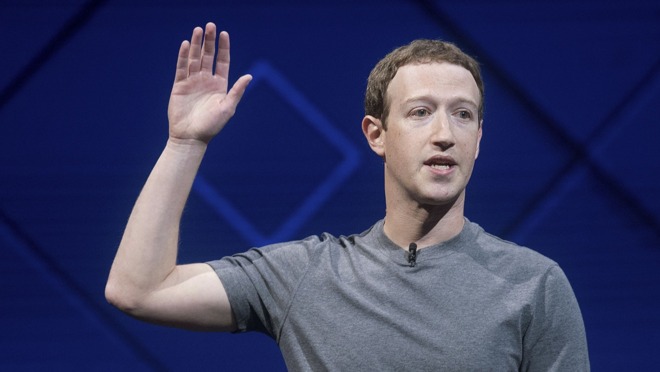Facebook CEO Mark Zuckerberg attempted to influence members of the US government into taking a closer look at Apple's business, a report examining the social network chief's political influence claims.

Facebook CEO Mark Zuckerberg
Zuckerberg was originally not one to discuss politics early in his tenure leading Facebook, but over time he has shifted his stance to becoming more political. In a look over how he moved into a role where he is taking a bigger interest in politics, it seems Zuckerberg's actions have also made some impact against its tech rivals.
People familiar with discussions between Zuckerberg and government officials speaking to the Wall Street Journal claim he has pushed for a greater scrutiny of both TikTok and Apple.
On the subject of Apple, Zuckerberg is said to have claimed to officials the iPhone maker doesn't seem to face as much scrutiny as the social network, despite it owning an operating system used by "a large percentage of Americans."
Apple has become the target of some investigations, such as copy-acquire-kill strategies, overbearing management of parental control apps, and its seeming monopoly power over the App Store.
However, it has been examined largely as part of a group of companies, which includes Facebook, Amazon, and Google. On Friday, Microsoft co-founder Bill Gates, who has considerable experience dealing with antitrust issues, suggested each company should be examined on a case-by-case basis, instead of en masse.
Zuckerberg has also allegedly held talks with White House senior adviser Jared Kushner and Treasury Secretary Steven Mnuchin, separately, discussing TikTok and its presence in the United States. The subjects of discussions were not mentioned by the report sources.
"Any insinuation that [Mr Zuckerberg] encouraged the Administration to ban TikTok is false," a spokesperson for FaceBook told the report.
The article also covers Zuckerberg's repeated communications with Kushner via Whatsapp, as well as ongoing efforts to make the social network seem as non-partisan as possible. This includes recent attempts to limit the impact of political advertising after the upcoming US election, and efforts to limit the impact of political misinformation.
Restricting misinformation has become a bigger issue for Facebook, as on Wednesday, both the social network and Twitter limited the sharing of an allegedly unverified New York Post report, writes CNBC. The article claimed to include a "smoking gun" email concerning Democratic presidential hopeful and former Vice President Joe Biden and son Hunter, which could have impacted the current election cycle.
The social networks stepped in to limit the sharing, citing a need to limit the spread of misinformation, with Twitter adding the material in the report violated policies due to broadcasting unredacted and supposedly hacked materials.
Both Zuckerberg and Twitter CEO Jack Dorsey are expected to testify to the State Commerce Committee on October 28, in a hearing about alleged bias on the social networks. It is highly probable that Post story's restrictions will be raised as part of that event.


